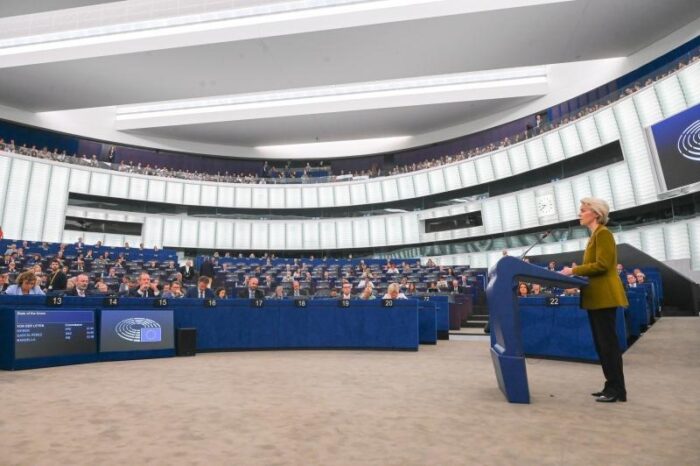The Progressive Post
Five ideas to make the EU future more social

As Socialists and Social Democrats, we are the political force that can better contribute to building on Europe’s commitment to social justice, equality and cohesion. It is in our DNA and will remain our core mission. The track record of policies that European progressives have put forward during the 2019-2024 legislature, spearheaded by EU Commissioner for Jobs and Social Rights Nicolas Schmit as well as other progressive commissioners and MEPs, is testament to this claim.
From the Platform Workers Directive to the EU Child Guarantee, from the Social Economy Action Plan to the EU Care Strategy, from the recommendation on individual learning accounts and the adults’ skills agenda to the EU Care Strategy, from the Social Climate Fund and the Just Transition Fund to SURE, and from NextGenerationEU to the EU Gender Equality Strategy – there is a lot of which to be proud. And then there is the directive on minimum wages and collective bargaining, which, after a decade of decrease in purchasing power, now signals a new era in which decent wages are no longer seen as a cost for European competitiveness, but as an essential strategy for a solid European economy.
With the mandate of the current Commission now coming to an end, it is worth pondering what lies ahead for Social Europe in the next legislature. What will happen after the completion of the Social Pillar Action Plan? Will we witness an expansion of Social Europe or a regrettable backtracking?
The European Pillar of Social Rights (EPSR) and its accompanying Action Plan have not been easy achievements, and it is undoubtedly thanks to the protracted political will exerted by Socialist-led EU presidencies that results have been attained – from Gothenburg to Porto, and from the Spanish EU presidency to the inter-institutional declaration of La Hulpe under the Belgian presidency of the Council of the EU.
Building a social future
With the European Union elections looming, and amidst the cacophony of divisive political discourse, it is of paramount importance for Socialists to articulate and pursue a bold vision for a fairer and more equitable Europe. By putting strong emphasis on well-being, social protection and the fight against inequalities, as well as by fighting for a Green Deal with a red heart, Socialists can gather support for the European project and engage as of now to make these matters key priorities in the next political programme of the European Commission. No one should forget that a pivotal aspect of security, besides defence, is financial security – which is related to jobs, wages, opportunities and access to quality services.
Building on the inputs of a recent study by FEPS, Social Platform, Solidar, EPC and AK Europa, and building also on the engaging discussion that took place with prominent progressive politicians at the PES Congress in Malaga during the event organised by the PES Group in the European Committee of the Regions and FEPS, Champions of progress – Progressives go the extra mile for Social Europe!, we set out five proposals below to substantiate the future of the European social agenda.
- A permanent SURE which helps protect wages, incomes and aggregate consumption whilst providing a very much-needed countercyclical fiscal boost to member states in case of recessions. SURE is a great innovation that Socialists brought about in the darkest moments of the pandemic, but it is not yet an integral part of EU economic governance, and we still need to push to ensure that this policy becomes a safeguard against future crisis.
- A European package for intergenerational fairness. The work on long-term care has just started and more targets need to be set. At the same time we also need to boost EU ambitions to solve the worrying conditions of young people who are not in education, employment or training (‘NEETs’) by truly unlocking opportunities for youth. Across Europe, around 15 per cent of 20- to 29-year-olds are not in work or training. It is self-evident that a fight to end unpaid internships can only be a minimum requirement. More concrete actions are needed for the new generations to be able to find fair remuneration and good working conditions in the European labour markets.
- An EU fund for just mobility. Mobility within the EU is still limited and should be promoted, but not to the detriment of convergence and cohesion. Persistent outflows generate a youth and brain drain and create a vicious circle: countries in a downturn lose human capital and tax revenues while better-off countries have inflows of skilled workers and income tax. The sustainability of the public finances of outflow-countries is endangered and the investment they have made in the education of locals ends up giving returns to the receiving country. The EU should be equipped with a fund to normalise the socio-economic impact of in- and out-flows. This policy would participate in the creation of new resources for the EU budget through contributions from those member states that benefit most from intra-EU mobility. The fund should be used to target investment and industrial policy in areas that, without EU intervention, risk serious divergence and impoverishment and the further loss of inhabitants.
- An EU minimum income directive. Many member states already have some forms of support for indigent households. However, in the majority of cases, such national schemes are unable to guarantee decent standards of living, and recipients remain below the poverty line. In other cases, administrative conditions for access to such national support limit its uptake by those who need it most. A European directive on minimum income schemes could provide the framework for member states to establish sufficient minimum income levels properly. In a recommendation of 2013, the European Council recognised the shortcomings of national minimum income schemes: guidelines alone are not working. What is needed is a directive with binding obligations and a timeline for member states to reach common quality criteria for coverage, adequacy and uptake.
- EU financial support for employment innovation. It is in the interest of the European Union to facilitate the emergence and scale-up of local, national or business initiatives that have been able to address some of the most pressing problems facing the quality and creation of employment. Given the presence of several novelties in the domain of employment, the EU should engage more structurally with those actors that innovate by financing the test-phases and scaling-up processes or the multiplications of successful initiatives. The European Social Fund could be the vehicle to generate further innovation in employment policy, with a new dedicated window for employment innovation. A specific line of financing should be reserved to launch, test and scale up initiatives that promote firstly, zero unemployment areas, secondly, shorter working week arrangements, and thirdly, democracy and well-being in the workplace.
Charting a vision for the future of the EU is a progressive mission that should be addressed head-on with bold proposals and ambitions. The Social Europe we want for the next EU mandate will respond to the needs of millions across the European continent and will contribute to a fairer, more inclusive society. As Socialists we constantly reaffirm our effort to build a more social Europe and to keep the social agenda high on the list of the European Commission’s priorities.
Photo credits: shutterstock.com/newphotoservice





